The Chief Technology Officer (CTO) plays a central role in any tech-driven organization. They are responsible for overseeing the development and dissemination of technology across an entire company.
Key skills for a CTO include a deep understanding of technological trends, leadership, strategic planning, and the ability to foster innovation. Assessing these skills effectively requires a combination of technical evaluations, leadership assessments, and strategic case studies.
Candidates can write these abilities in their resumes, but you can’t verify them without on-the-job Chief Technology Officer skill tests.
In this post, we will explore 9 essential Chief Technology Officer skills, 11 secondary skills and how to assess them so you can make informed hiring decisions.
Table of contents
9 fundamental Chief Technology Officer skills and traits
The best skills for Chief Technology Officers include Technical Vision, Software Development, System Architecture, Cybersecurity, Data Management, Cloud Computing, Project Management, Vendor Management and Innovation Management.
Let’s dive into the details by examining the 9 essential skills of a Chief Technology Officer.
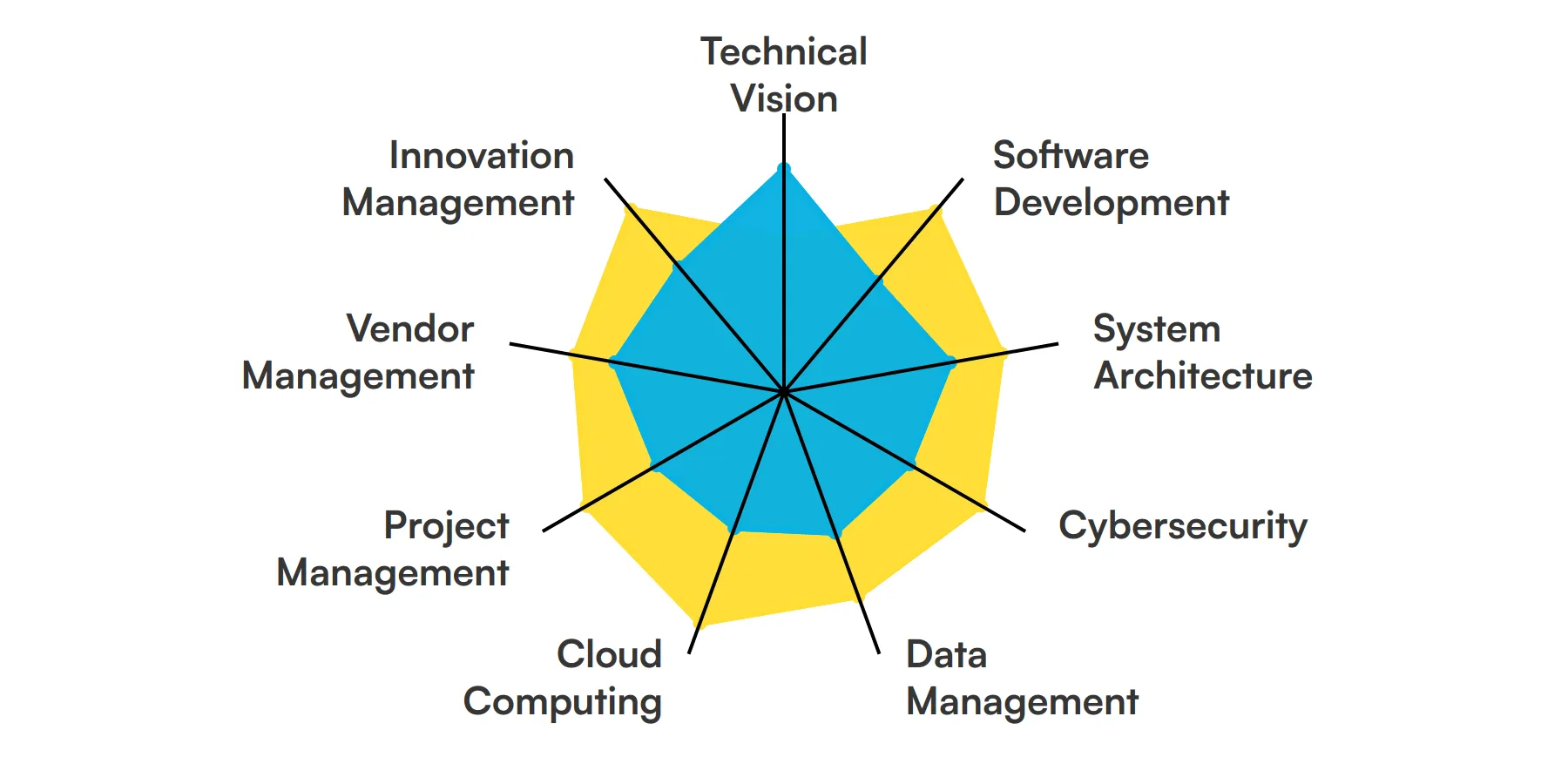
Technical Vision
A Chief Technology Officer (CTO) must have a clear and strategic technical vision. This involves understanding emerging technologies and how they can be leveraged to drive the company's goals. The CTO uses this skill to align the tech roadmap with business objectives, ensuring long-term growth and innovation.
For more insights, check out our guide to writing a Chief Technology Officer Job Description.
Software Development
Proficiency in software development is crucial for a CTO. This skill allows them to understand the intricacies of the development process, make informed decisions about technology stacks, and guide the engineering team effectively. It also helps in evaluating the technical feasibility of new projects.
System Architecture
System architecture involves designing and overseeing the implementation of complex systems. A CTO uses this skill to ensure that the company's technology infrastructure is scalable, secure, and efficient. This is key to maintaining robust and reliable systems that support business operations.
Check out our guide for a comprehensive list of interview questions.
Cybersecurity
In today's digital age, cybersecurity is paramount. A CTO must be adept at identifying potential security threats and implementing measures to protect the company's data and systems. This skill is essential for safeguarding the organization against cyber attacks and ensuring compliance with data protection regulations.
Data Management
Effective data management is critical for making informed business decisions. A CTO needs to oversee the collection, storage, and analysis of data. This skill helps in leveraging data to gain insights, optimize operations, and drive strategic initiatives.
For more insights, check out our guide to writing a Data Manager Job Description.
Cloud Computing
Cloud computing expertise is essential for modern CTOs. This involves understanding cloud services and how to integrate them into the company's infrastructure. The CTO uses this skill to enhance scalability, reduce costs, and improve accessibility of technology resources.
Project Management
Project management skills enable a CTO to oversee technology projects from inception to completion. This includes planning, executing, and monitoring projects to ensure they are delivered on time and within budget. It also involves coordinating with various teams to achieve project goals.
Vendor Management
A CTO often works with external vendors for various technology needs. Vendor management skills are necessary to negotiate contracts, manage relationships, and ensure that vendors deliver quality services. This helps in maintaining a smooth and cost-effective technology supply chain.
Innovation Management
Innovation management involves fostering a culture of innovation within the technology team. A CTO uses this skill to encourage creative problem-solving and the development of new technologies. This is crucial for staying ahead in a competitive market and driving continuous improvement.
11 secondary Chief Technology Officer skills and traits
The best skills for Chief Technology Officers include Agile Methodologies, DevOps, IT Governance, Budgeting, Networking, AI and Machine Learning, Blockchain, Mobile Development, User Experience (UX) Design, Compliance and Disaster Recovery.
Let’s dive into the details by examining the 11 secondary skills of a Chief Technology Officer.
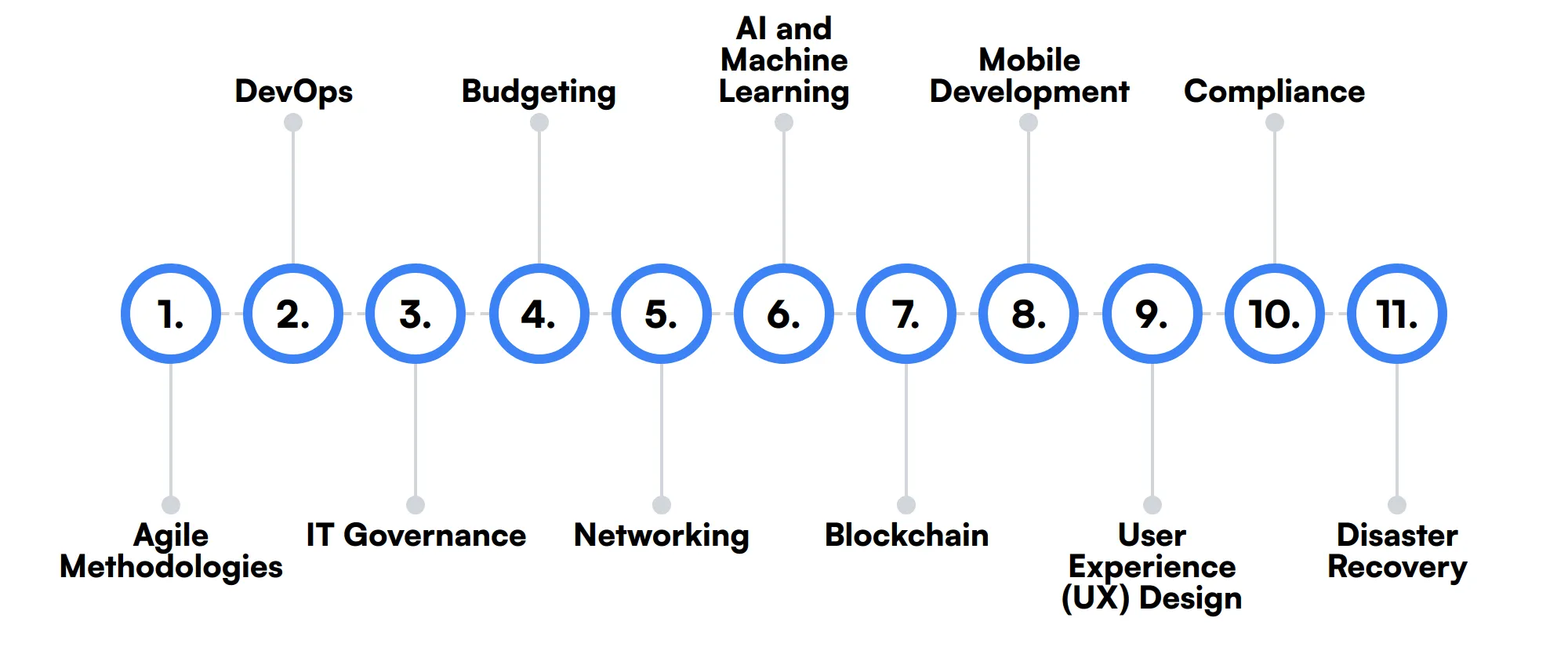
Agile Methodologies
Understanding agile methodologies helps a CTO implement flexible and iterative development processes. This skill is useful for adapting to changing requirements and improving the efficiency of the development team.
DevOps
DevOps knowledge allows a CTO to streamline the development and operations processes. This skill helps in automating workflows, improving collaboration between teams, and accelerating the delivery of software products.
IT Governance
IT governance involves establishing policies and procedures for managing the company's IT resources. A CTO uses this skill to ensure that technology investments align with business goals and comply with regulatory requirements.
Budgeting
Budgeting skills are important for managing the technology budget effectively. A CTO needs to allocate resources wisely, control costs, and ensure that technology investments provide a good return on investment.
Networking
Networking skills are essential for building and maintaining the company's IT network. This includes understanding network architecture, troubleshooting issues, and ensuring reliable connectivity for all users.
AI and Machine Learning
Knowledge of AI and machine learning enables a CTO to explore advanced technologies that can drive innovation. This skill is useful for developing intelligent systems and leveraging data for predictive analytics.
Blockchain
Blockchain expertise can be valuable for a CTO in industries where secure and transparent transactions are critical. This skill helps in exploring blockchain applications and integrating them into the company's technology stack.
Mobile Development
Understanding mobile development is important for a CTO in companies that offer mobile applications. This skill helps in guiding the development of user-friendly and high-performance mobile apps.
User Experience (UX) Design
UX design skills enable a CTO to ensure that the company's products provide a great user experience. This involves understanding user needs, designing intuitive interfaces, and improving overall usability.
Compliance
Compliance knowledge is necessary for ensuring that the company's technology practices adhere to legal and regulatory standards. This skill helps in avoiding legal issues and maintaining a good reputation.
Disaster Recovery
Disaster recovery planning is crucial for minimizing downtime and data loss in case of an emergency. A CTO uses this skill to develop and implement strategies for quickly restoring operations after a disruption.
How to assess Chief Technology Officer skills and traits
Assessing the skills and traits of a Chief Technology Officer (CTO) involves more than just glancing at a resume. It requires a deep dive into their capabilities across various technical and managerial domains. A CTO's role is multifaceted, encompassing technical vision, software development, system architecture, and more.
To truly understand if a candidate is fit for the CTO role, companies must evaluate their expertise in areas like cybersecurity, data management, cloud computing, and project management. This comprehensive assessment ensures that the CTO can handle the strategic and operational challenges of the position.
Using structured assessments can dramatically streamline the hiring process. For instance, Adaface assessments are designed to measure a candidate's proficiency across necessary skills such as innovation management and vendor management, helping you achieve an 85% reduction in screening time.
Let’s look at how to assess Chief Technology Officer skills with these 5 talent assessments.
Technical Aptitude Test
Our Technical Aptitude Test evaluates a candidate's general technical knowledge and problem-solving skills, covering a broad range of topics from programming fundamentals to software engineering.
The test assesses candidates on their understanding of basic computer concepts, data structures, database management, and their ability to apply logical reasoning and analytical skills in solving technical problems.
Successful candidates demonstrate a strong grasp of technical concepts and the ability to think critically about complex technical challenges.
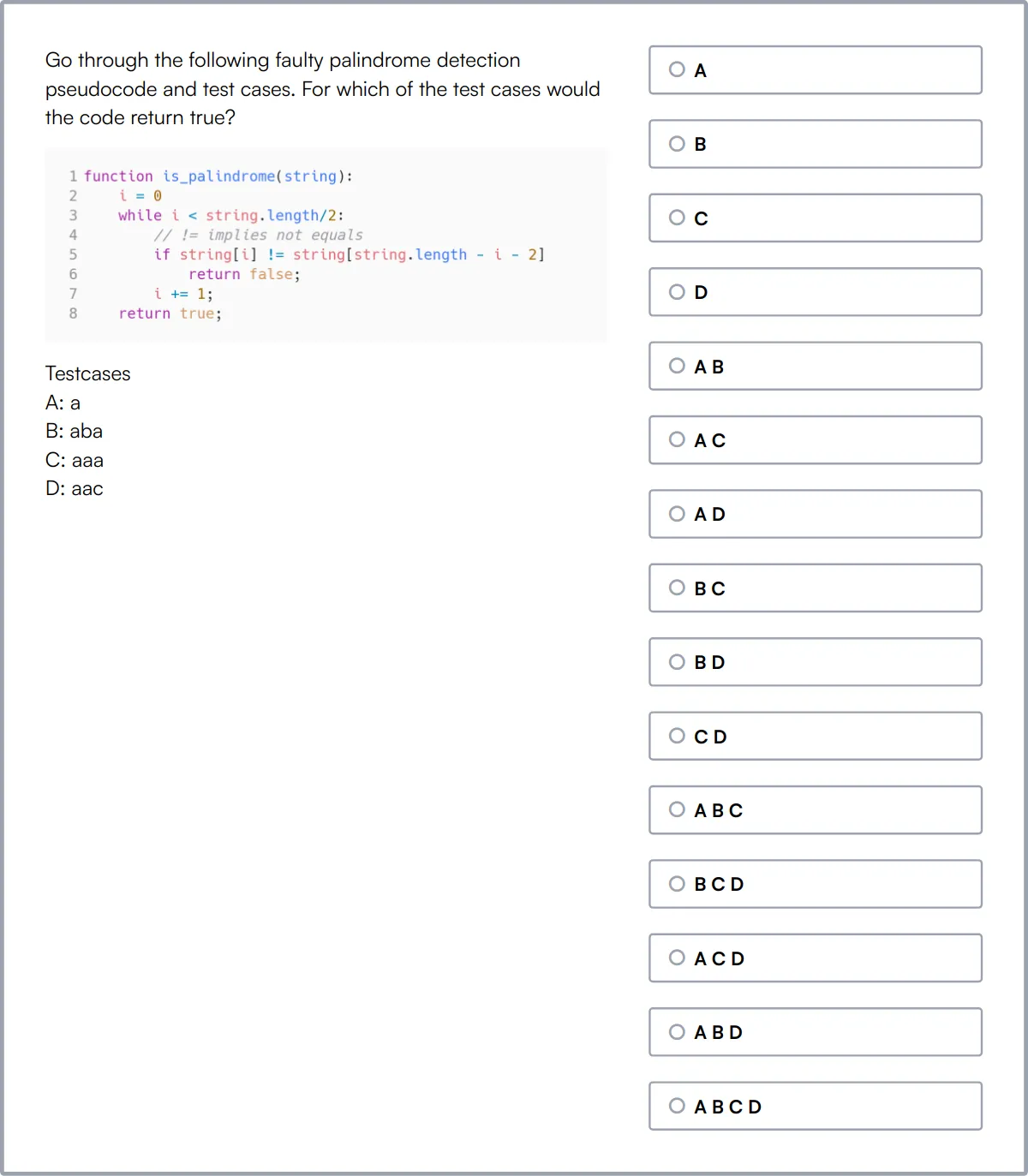
Software Engineering Online Test
Our Software Engineering Online Test challenges candidates with scenario-based questions on core computer science concepts and includes a coding question to evaluate hands-on programming skills.
This test evaluates understanding in areas such as object-oriented programming, database design, algorithms, and software security, ensuring candidates can handle real-world software development challenges.
It also tests candidates' abilities in code optimization and quality assurance, crucial for developing efficient and reliable software.

System Design Online Test
Our System Design Online Test assesses candidates on their proficiency in designing software systems that meet both functional and non-functional requirements.
Candidates are tested on their ability to create high-level design specifications, choose appropriate architectures, and integrate systems focusing on security and performance optimization.
High-scoring candidates will show a deep understanding of system integration and the ability to design scalable and secure software architectures.
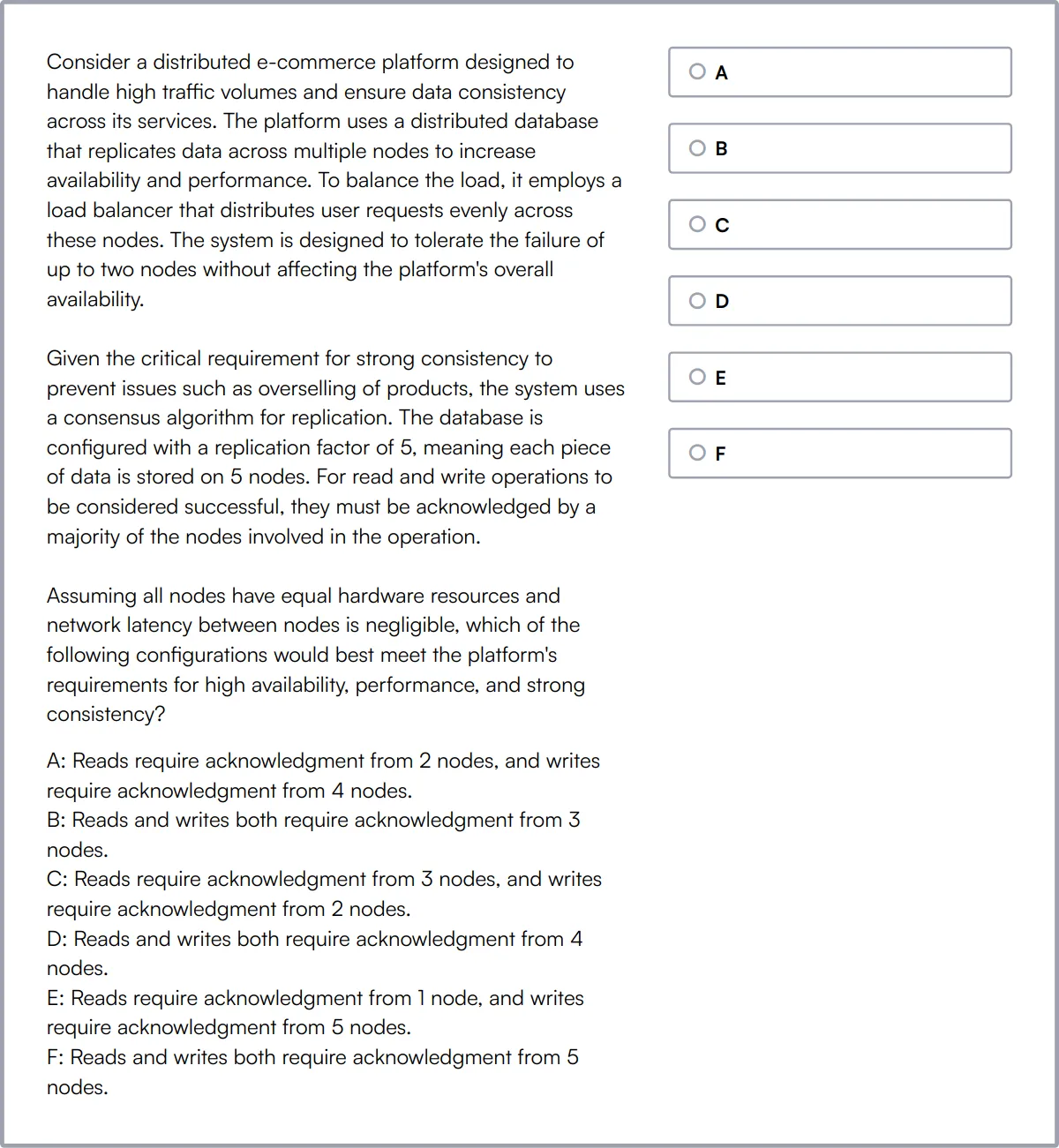
Cyber Security Assessment Test
Our Cyber Security Assessment Test evaluates a candidate's knowledge in cybersecurity, from basic concepts to advanced protection techniques against cyber threats.
The test covers a wide range of cybersecurity topics, including network security, cryptography, and various types of cyber attacks, assessing the candidate's ability to secure systems and mitigate risks.
Candidates proficient in cybersecurity will demonstrate a strong ability to implement effective security measures and respond to security incidents.
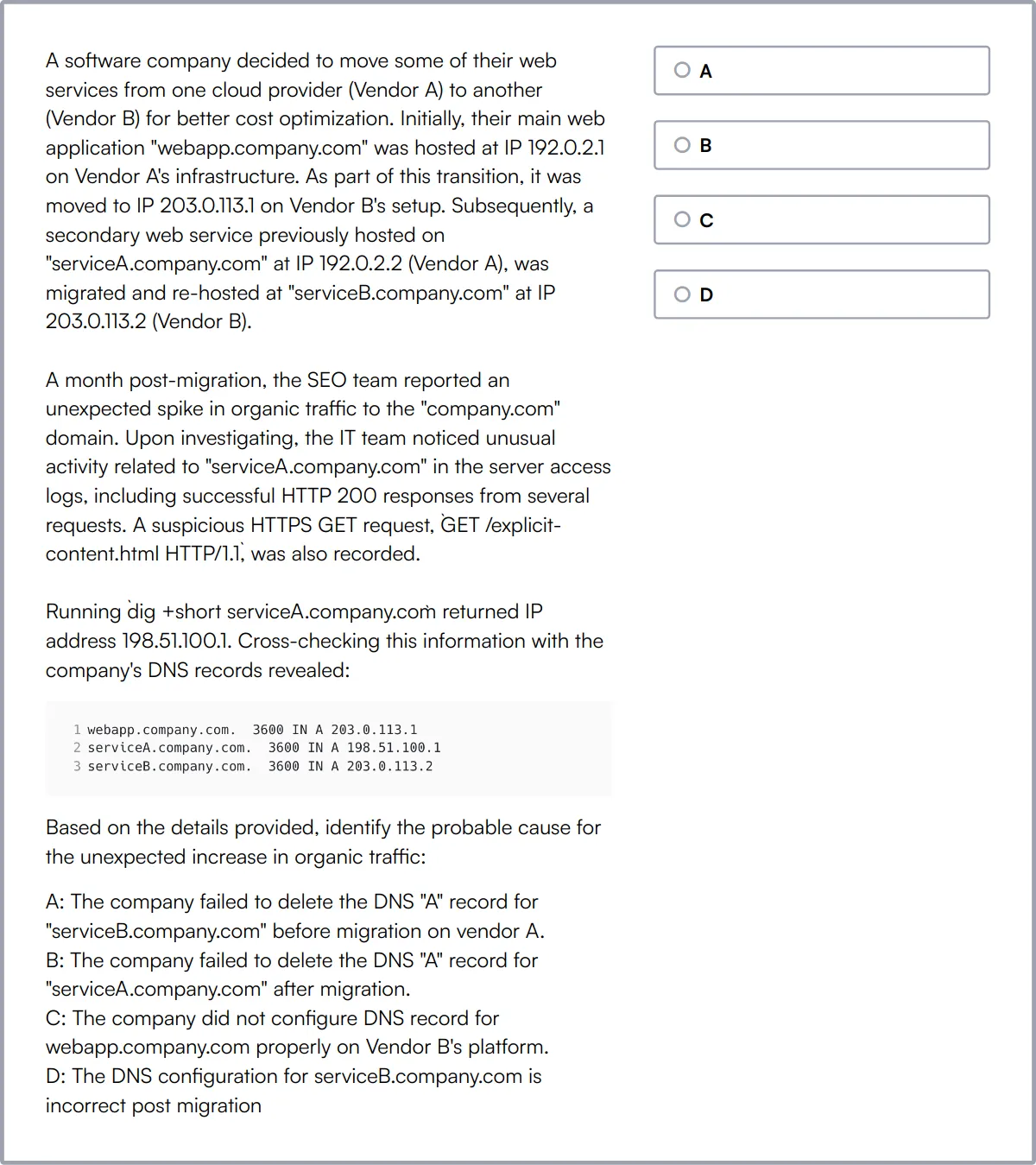
Cloud Computing Online Test
Our Cloud Computing Online Test assesses a candidate's understanding of cloud computing, from basic concepts to advanced cloud solutions.
The test evaluates knowledge in cloud service models, virtualization, cloud security, and cloud storage management, ensuring candidates are equipped to work with modern cloud technologies.
Candidates excelling in this test demonstrate a strong capability in managing scalable, secure cloud environments and optimizing cloud resources.
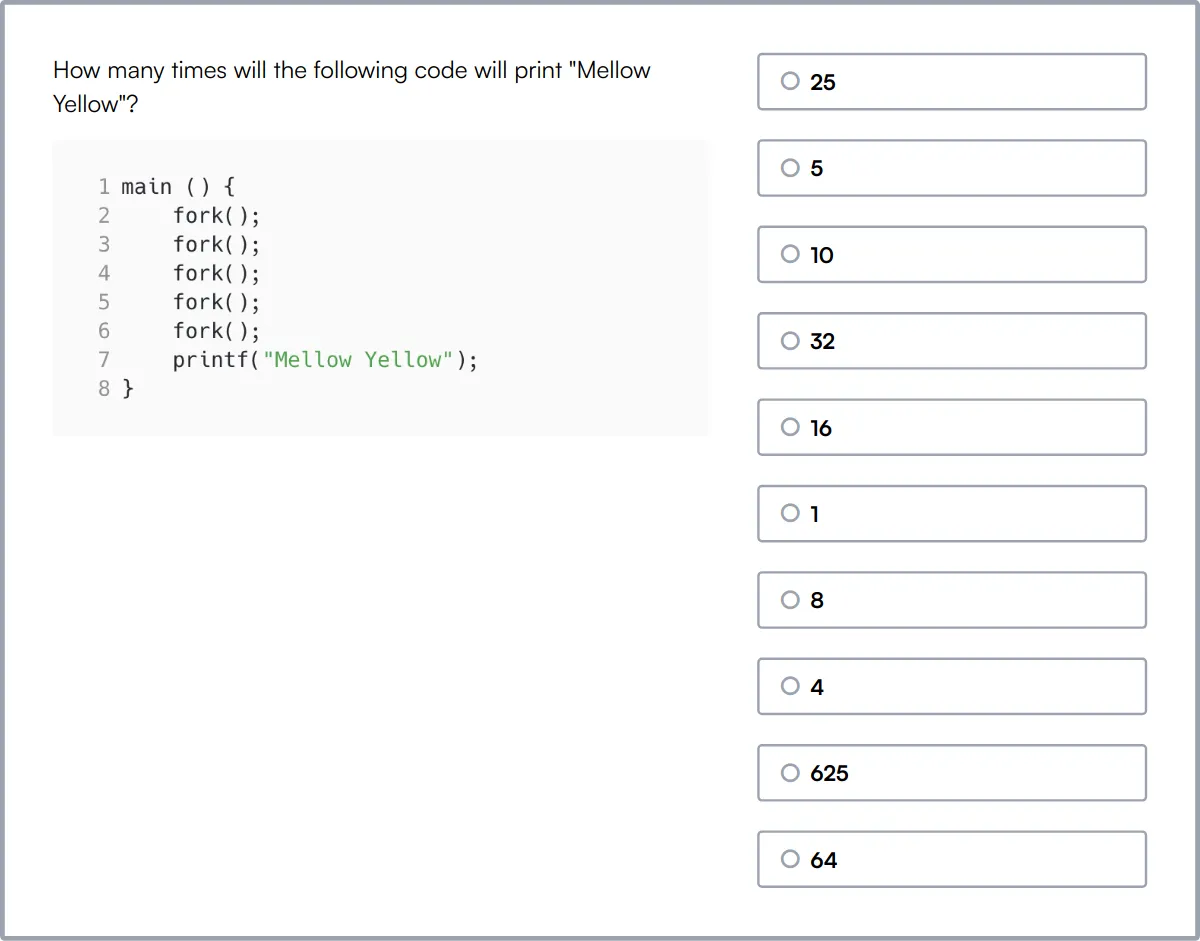
Summary: The 9 key Chief Technology Officer skills and how to test for them
| Chief Technology Officer skill | How to assess them |
|---|---|
| 1. Technical Vision | Evaluate ability to forecast tech trends and align them with company goals. |
| 2. Software Development | Assess proficiency in coding, debugging, and deploying software applications. |
| 3. System Architecture | Review expertise in designing scalable and sustainable technology infrastructures. |
| 4. Cybersecurity | Check knowledge of securing systems against cyber threats and vulnerabilities. |
| 5. Data Management | Determine capability to organize, store, and retrieve company data effectively. |
| 6. Cloud Computing | Gauge experience with cloud services and managing cloud-based resources. |
| 7. Project Management | Examine skills in leading projects from inception to completion. |
| 8. Vendor Management | Assess ability to select and manage third-party service providers. |
| 9. Innovation Management | Evaluate how well one initiates and manages innovative processes. |
Cyber Security Assessment Test
Chief Technology Officer skills FAQs
What technical skills should a Chief Technology Officer possess?
A Chief Technology Officer should be proficient in software development, system architecture, cybersecurity, and cloud computing. Knowledge in AI, machine learning, and blockchain is also beneficial.
How important is project management for a CTO?
Project management is key for a CTO as it involves planning, executing, and overseeing projects to ensure they are completed on time and within budget, aligning with the company's strategic goals.
What are the best ways to assess a CTO candidate's skills in innovation management?
To assess a candidate's innovation management skills, review their past projects focusing on the implementation of new technologies and solutions. Also, discuss their approach to fostering innovation within a team.
Why is vendor management important for a CTO?
Vendor management is important as it helps ensure that third-party services and products meet the company's needs at a competitive price, which is crucial for maintaining operational efficiency and budget control.
Can you explain the role of IT governance in a CTO's responsibilities?
IT governance is integral to a CTO's role as it involves overseeing and ensuring compliance with policies and regulations, managing risks, and aligning IT strategies with the organization's objectives.
What should a CTO know about disaster recovery?
A CTO should have a solid understanding of disaster recovery planning and implementation to ensure business continuity and data integrity in the event of a system failure or other disruptions.
How does understanding UX design benefit a CTO?
Understanding UX design benefits a CTO by enabling them to lead projects that enhance user satisfaction and engagement, which directly impacts the success of the company's products and services.
What role does budgeting play in a CTO's day-to-day tasks?
Budgeting is crucial for a CTO as it involves allocating resources effectively across projects and operations, ensuring that financial resources are used to support strategic technological advancements.

40 min skill tests.
No trick questions.
Accurate shortlisting.
We make it easy for you to find the best candidates in your pipeline with a 40 min skills test.
Try for freeRelated posts
Free resources



